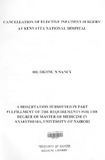| dc.description.abstract | Background: Cancellation of operations in hospitals is a significant problem with far reaching consequences. It is therefore important to analyze cancellation of surgery in every setting.
Objective: This was a prospective observational study conducted over six weeks from I st July 2011 to 14th August 2011. The main objective was to determine the incidence, the pattern and the commonest reasons for cancellation of elective inpatient surgery in Kenyatta National Hospital. Setting and Population: The main study area was at KNH's main theatre and the study population was patients scheduled for elective inpatient surgery at Kenyatta National Hospital.
Methodology: Over a period of six weeks from 11 th July to 22nd August 2011 a list of all patients scheduled for elective inpatient surgery was compiled. Each day a form was filled for all operations that were cancelled. A cancellation was defined as any operation that appeared on the definitive theatre list that was subsequently not performed. The reasons for cancellation were documented.
Results: A total of 1,547 patients were booked for surgery during the study period. Out of these, 318 patients were cancelled resulting in a cancellation rate of 20.6%. Cardiothoracic surgery had the highest cancellation rate (38%) followed by neurosurgery (37.8%), orthopaedic surgery (32.6%), general surgery( 28%), paediatric surgery(22%), maxillofacial surgery (19.2%), urology (19%), obstetrics and gynaecology (16.9%), ENT (15.4%), ophthalmology (12.9%), private wing (6.4%). Hospital non clinical reasons were the commonest reasons for cancellation (61.7%) followed by hospital clinical reasons (30.1 %) and patient reasons (8.2%).
The six commonest specific reasons for cancellation were lack of time (43.8%), lack of blood (14.9%), patient illness (8.5%), consultant unavailability (6.7%), .patient did not arrive (6.1 %) and administrative/logistic errors (4.9%). These six reasons accounted for approximately 84.9% of the cancellations. More than 60% of the cancellations were avoidable.
Conclusion: Cancellation of elective surgery occupies a substantial population (20.6%) of cases in KNH. Majority of these cancellations were due to hospital non clinical reasons with lack of time being the commonest reason. More than 60% of the cancellations were avoidable with better management. | en_US |

